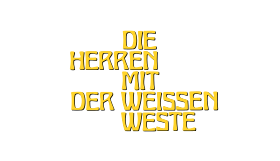The gentlemen in the white vests
| Movie | |
|---|---|
| Original title | The gentlemen in the white vests |
| Country of production | Germany |
| original language | German |
| Publishing year | 1970 |
| length | 90 minutes |
| Age rating | FSK 12 |
| Rod | |
| Director | Wolfgang Staudte |
| script |
Horst Wendlandt , Paul Hengge |
| production |
Rialto Film , Berlin ( Horst Wendlandt ) |
| music | Peter Thomas |
| camera | Karl Löb |
| cut | Jane Sperr |
| occupation | |
| |
The Gentlemen with the White Waistcoat is a German feature film from 1970. The plot of the crime comedy directed by Wolfgang Staudte is set in Berlin . The world premiere took place on March 12, 1970 in the Gloria-Palast , Berlin.
action
At the beginning of the film, the criminal Bruno Stiegler aka Dandy returns from the United States as a boxing promoter to West Berlin . The boxing business serves him more as a camouflage, because it soon turns out that he wants to carry out various planned raids with his gang.
The now retired higher regional judge Zänker tried in vain during his active service to bring Dandy behind bars by legal means. Now he is turning the tables with his friends and his sister Elisabeth. His old friends and colleagues meet in his house disguised as a male choir and turn out to be a gang of retirees who take on dandy's gang. Brawler succeeds in doing this by using Pietsch, whom he had previously convicted and supported in the pardon, as an informant in Dandy's gang.
So Dandy wants to steal the income from a Hertha BSC football game from the Olympic Stadium, but brawlers get ahead of him. Zänker achieved the same in Dandy's attempt to rob the dubious businessman Kunkelmann's safe and to clear the Haase jewelry store at a parade.
It is spicy that Zänker's son-in-law Walter, who lives with his daughter Monika in the house at Zänker, works as a criminal inspector for the police and is tasked with investigating these crimes. In fact, Walter's superior, Inspector Berg, finally appears in person at his old friend's brawl to arrest him. In a one-to-one conversation, Zänker lets the inspector in on his motive and his method and wins his understanding.
An arrest warrant is issued against Dandy, and Zänker, with the help of Pietsch, succeeds by exchanging the suitcases, all stolen goods from Dandy. Immediately before Dandy's departure, all of the looted property is found in his suitcase. This gives the police a certificate that Dandy actually committed the crimes and that Dandy is being taken away. In fact, after his retirement, Zänker finally achieved what he had tried in vain legally in his profession for a long time.
background
Producer Horst Wendlandt was also active here under the pseudonym "HO Gregor" as an idea generator and co-screenwriter. The film was shot from November 10th to December 18th, 1969 in the CCC studios in Berlin-Spandau and in West Berlin. Many interior shots were taken - similar to the films Willi The Child Will Swing and One of Us Both - in a house on Hugo-Vogel-Strasse in Berlin-Wannsee . The prominent cast includes representatives of the comedic (Heinz Erhardt, Walter Giller) as well as the serious subject (Martin Held, Mario Adorf). The production completely dispenses with the depiction of violence and instead emphasizes that the older, basically “respectable gentlemen” can, thanks to their experience, still cheat the boys if they want to.
The film itself points to the special situation in divided Berlin: Dandy and the gentlemen know that during the Allied military parade, which has always taken place on July 1st since 1964, the alarm system of the jeweler Hase in the Bismarckstrasse in the West Berlin district of Charlottenburg must remain switched off. In addition, the undercover agent Pietsch lives in a social housing funded by the Berlin Senate on the outskirts of Berlin Tempelhof Airport, which at the time was built for lower incomes and students due to the move from the Federal Republic to Berlin (West). The interior recordings took place in the studios of the Berliner Union-Film on Oberlandstrasse in West Berlin. Since the higher regional court in Berlin is called Kammergericht , there were no higher regional judges as in the film, but higher regional judges.
Reviews
"A light-hearted, cheerful crook comedy, solidly constructed and witty staged. Not least because of the excellent cast of actors, it was an extraordinary German entertainment film, not only for the (cinema) conditions at the time [...]. "
"Jokes, satire, irony and a little deeper meaning for the Germany of the economic miracle."
“Sharp satire with wit and charm; Shine role for hero. Rating: above average. "
The German Film and Media Evaluation FBW in Wiesbaden awarded the film the title valuable.
Web links
- The gentlemen in the white waistcoat in the Internet Movie Database (English)
- The men with the white vest at filmportal.de
Individual evidence
- ^ CineGraph - Lexicon for German-language film - Wolfgang Staudte
- ↑ File: Hugo-Vogel-Straße 27 (Berlin-Wannsee) .jpg . In: Wikipedia . ( wikipedia.org [accessed November 21, 2019]).
- ↑ National film and television classics, locations: Heinz Erhardt films. Retrieved November 21, 2019 .
- ^ Lexicon of International Films
- ↑ Heyne Film Lexicon, 1996.
- ^ Adolf Heinzlmeier and Berndt Schulz : Lexicon "Films on TV" (extended new edition). Rasch and Röhring, Hamburg 1990, ISBN 3-89136-392-3 , p. 358.

